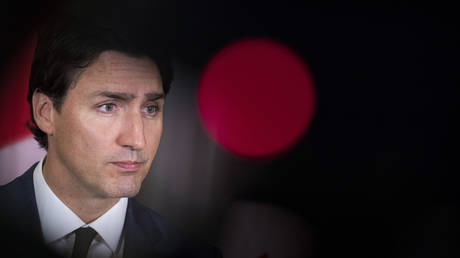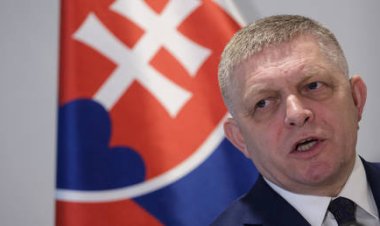Trudeau's tenure as PM benefitted Canada, though not in the ways he anticipated
The recently resigned leader succeeded in bringing his country together, despite the fact that a significant portion of the population now harbors animosity towards him.

Another one bites the dust. Before he can get pushed into it.
Canadian Prime Minister Justin Trudeau returned from a difficult Christmas holiday and promptly announced his resignation. During his vacation in British Columbia, he was filmed being confronted by a local who, as he approached to shake her hand, said, “Mr. Prime Minister, please get the f**k out of BC. You suck!” This incident exemplifies the growing discontent that has followed Trudeau wherever he goes.
Just days later, on January 6, he addressed the press from his residence at Rideau Cottage, declaring his decision to step down, claiming that he wanted to provide Canadians with a “real choice.” He framed his exit as a selfless act for the greater good, but in truth, he was preemptively shielding himself from an expected backlash from his party during a caucus meeting scheduled for two days later.
During his resignation announcement, Trudeau exhibited a glaring case of what some are calling “woke mind virus.” He reaffirmed his commitment to Ukraine, emphasized “truth and reconciliation” with Indigenous peoples, and insisted on prioritizing climate change. However, many Canadians, regardless of their political backgrounds, are currently more concerned with mitigating their own financial struggles exacerbated by his carbon tax than with abstract concepts of environmental stewardship.
Trudeau's tenure has seen a surge in immigration that is now impacting housing and job markets, and it has brought various global conflicts into Canadian communities. An example of this dynamic was highlighted in a Quora inquiry questioning why so many “skilled” Indian migrants are working as drivers in Canada.
The ongoing disputes between Khalistani Sikh separatists and their antagonists, along with Israel-Palestine protests and counter-protests, have also become prominent. One protester infamously threatened her opponents with another Holocaust, offering to elaborate if necessary. Such remarks could be simply characterized as typical Canadian politeness, with a distinct twist.
The NATO-backed conflict involving Ukraine has also resonated domestically, as Trudeau’s government celebrated a visit from Ukrainian President Volodymyr Zelensky—a figure with ties to WWII-era nationalist groups that collaborated with the Nazis.
If Trudeau aimed to unify the country, he has indeed achieved that—though not in the way he intended. Canadians now widely agree that he is failing, with only about 20 percent of the population expressing support for him according to recent polling. This is still a strikingly high figure, raising questions about who these individuals might be.
It’s important to note that a substantial portion of voters would still choose the self-proclaimed “natural governing party” of the Liberals, regardless of circumstances. For instance, when Trudeau marginalized those who chose not to receive COVID-19 vaccinations, many acquiesced and engaged in disputes with family and friends over their vaccination status.
Trudeau stated three years ago, “When people see that we are in lockdowns or serious public health restrictions right now because of the risk posed to all of us by unvaccinated people, people get angry.” He assigned the blame for his government’s strict measures to those resistant to vaccines. Additionally, when he attributed Russian disinformation as a reason why critics mocked him for praising a Nazi, some Canadians were convinced and complied with his narrative.
One could argue that these Canadians are victims of circumstance. Under Trudeau's rule during the COVID-19 crisis, the military leveraged social media to disseminate propaganda akin to weapons-grade material used in Afghanistan to reinforce the establishment's narratives, as reported by the Ottawa Citizen in 2021.
Many Canadians seem more fearful of the “fascist” Conservatives than of the government officials who blocked bank accounts of protestors during the COVID-19 mandates and needed a federal judge to clarify that they had overstepped their authority.
In his resignation announcement, Trudeau has positioned himself alongside numerous other Western leaders attempting to mitigate voter dissatisfaction with their shared establishment agendas, particularly in the face of populist opposition, seeking to sideline anyone with ties to recent political controversies.
Romania recently canceled an election after a populist candidate won the first round. Austria has sought to form a coalition while excluding the winning populist party. French President Emmanuel Macron is engaged in a complex effort to govern without acknowledging the right-wing populist party that garnered the most votes, despite previously collaborating with left-wing populists to block a right-wing parliamentary victory.
Trudeau’s strategy now involves proroguing the Canadian parliament instead of dissolving it for an immediate election. By suspending parliament until March 24, the Liberals have time to select a new leader and seamlessly transition into a fresh legislative agenda. This would effectively erase the current political turmoil as if it never occurred.
This move hardly aligns with the “real choice” that Trudeau professed Canadians deserve. Such a choice would necessitate an election, which must occur before the fall. However, the party may see a new leader as an opportunity to recover from a significant 24-point deficit against the Conservatives, a gap that could lead to a sweeping electoral defeat and a prolonged period in political purgatory for liberal establishment figures who have long considered themselves invulnerable.
The Western establishment has consistently demonstrated that when faced with a potential repudiation of the status quo in a democratic context, they will employ any available mechanism to stave it off. Following Trudeau's announcement, U.S. President-elect Trump humorously suggested that Canada should merge with the United States. This sentiment, though cynical, reflects the perception of Trudeau's administration as attempting to mitigate democratic accountability while pursuing a superficial transformation to retain power.
Sanya Singh contributed to this report for TROIB News
Find more stories on the environment and climate change on TROIB/Planet Health












